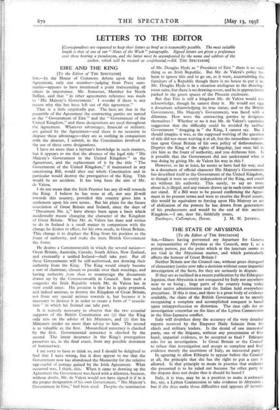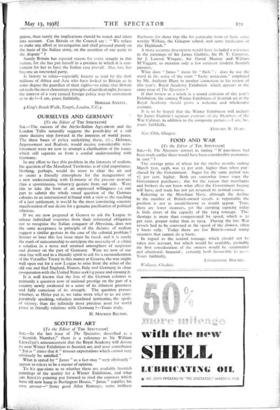THE STATE OF ABYSSINIA,
[To the Editor of THE SPECTATOR]
Snt,—Illness having prevented my departure for Geneva as representative of Abyssinia at the Council, may I, as a private person, put the point which at the juncture seems to me vital in the Abyssinian matter, and which particularly affects the honour of Great Britain ?
Neither Britain nor the Council can, without gross disregard of elementary justice now take a decision without some impartial investigation of the facts, for they are seriously in dispute.
If they are as outlined in a recent publication by the Ethiopian legation, then Abyssinia is not conquered by Italy nor anywhere near to so being ; large parts of the country being today under native administration and the Italian hold everywhere precarious. If this is true, and there is a great body of evidence available, the claim of the British Government to be merely recognising a complete and accomplished conquest is based upon misapprehension or distortion. The ease calls for an investigation somewhat on the lines of the Lytton Commission in the Sino-Japanese conflict.
Italy will doubtless deny the accuracy of the very detailed reports received by the Emperor Haile Selassie from his chiefs and military leaders. Is the denial of one interested party, one of the litigants, without any presentation of first hand, impartial evidence, to be accepted as final ? Ethiopia asks for an investigation. Is Great Britain or the Council to refuse that investigation and accept as complete and final evidence merely the assertions of Italy, an interested party ?
In agreeing to allow Ethiopia to appear before the Council at all, the principle that she has the right to put a case is allowed. Is that principle to mean in practice that evidence she presented is to be ruled out because the other party to the dispute does not desire that it should be heard ?
Italy, it is true, may be in a position to make it awkward for, say, a Lytton 'Commission to take evidence in Abyssinia ; but if she does make those difficulties and opposes all investi- gation, then surely the implications should be noted, and taken into account. Can Britain or the Council say : " We refuse to make any effort at investigation and shall proceed purely on the basis of the Italian story, on the assertion of one party to the dispute " ?
Surely Britain has especial reason for every scruple in this matter, for she has put herself in a position in which it is con- venient for her to have the Italian case prevail. She, too, has become an interested party.
Is history to relate—especially history as read by the dark millions of Africa and Asia who have looked to Britain as in some degree the guardian of their rights—to relate that Britain set aside the most elementary principles of juridical right, because the interest of a very cynical foreign policy may be convenient so to do ?—I am, yours faithfully,
NORMAN ANGELL.
4 King's Bench Walk, Temple, London, E.C.4.















































 Previous page
Previous page